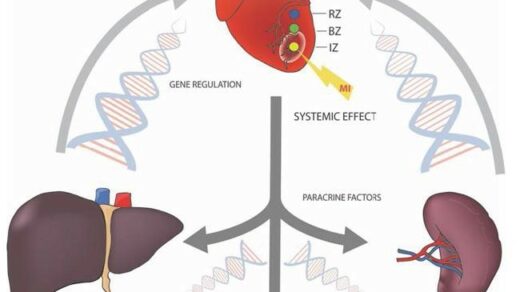“To our knowledge, this is the first case/control study to show a significant genetic association with mastocytosis at the KIT M541L locus.“
Scientists have discovered that a genetic variant called KIT M541L may play an important role in a rare immune disorder known as mastocytosis. The findings may help explain why some patients develop more severe forms of the disease.
Understanding Mastocytosis
Mastocytosis is a condition where the body produces too many mast cells. These cells are part of the immune system and help the body fight infections, but in excess, they release chemicals that can cause itching, swelling, and even serious organ damage.
There are two main types of mastocytosis. The first is cutaneous mastocytosis, which mostly affects the skin. The second is systemic mastocytosis, a more serious form where mast cells build up in internal organs like the liver, spleen, and bone marrow.
The disease is linked to mutations in the KIT gene, which regulates mast cell growth. The most studied mutation is KIT D816V, but recent research has highlighted another variant, KIT M541L.
The Study: Impact of KIT M541L Variant
A team of researchers at the National Institutes of Health (NIH), led by first author Luisa N. Dominguez Aldama and corresponding author Melody C. Carter, aimed to better understand the prevalence and impact of the KIT M541L genetic variant in mastocytosis patients. The study published in Oncotarget on July 22, 2024, titled “Prevalence and impact of the KIT M541L variant in patients with mastocytosis,” examined the presence of the KIT M541L gene variant in 100 patients with mastocytosis, both adults and children, alongside 500 healthy individuals. By comparing these two groups, the researchers wanted to see if there was a relation between the KIT M541L variant and mastocytosis severity.
The Challenge: Limited Knowledge of Genetic Influences
Clinicians and researchers still do not fully understand why some people with mastocytosis experience only skin-related symptoms, while others develop the more dangerous systemic form. Learning more about genetic differences could help explain this and lead to improved treatments.
Results: KIT M541L Influences Mastocytosis Severity
The study found that 19% of mastocytosis patients carried the KIT M541L variant, most of whom had European ancestry. This variant was observed in both pediatric and adult patients but was particularly associated with adult systemic mastocytosis.
“Our patients with mastocytosis mapped to the European control population with a higher frequency compared to other ancestral data points. Indeed, our patient cohort at the NIH mirrors this distribution with 92% having European ancestry […]”
Interestingly, nearly all patients with the KIT M541L mutation also had the KIT D816V mutation, suggesting that M541L may intensify disease severity without being a direct cause.
The findings also showed that individuals with two copies of the KIT M541L variant—one from each parent—were nearly five times more likely to have systemic mastocytosis than those without the variant.
Some differences in symptoms were also noted. For example, patients with two copies of the M541L variant were less likely to have an enlarged spleen, a common problem in systemic mastocytosis. Despite these findings, researchers did not observe significant differences in standard lab results, such as blood mast cell levels, between patients with and without the M541L variant.
The Breakthrough: KIT M541L Variant’s Role
This study is the first to demonstrate a significant genetic association between KIT M541L and systemic mastocytosis. Unlike prior research that overlooked this variant, this study shows that KIT M541L, especially when inherited in a homozygous form, significantly increases the risk of systemic mastocytosis.
“This investigation is the largest study to date of KIT M541L variant in both adults and pediatric patients with cutaneous and systemic disease, and the first to document a homozygous mutation in a patient that met criteria for systemic disease without an additional KIT mutation.”
The Potential: Toward Personalized Treatments
These findings could lead to more personalized treatment approaches. For instance, patients with the KIT M541L mutation may respond differently to mast cell-targeting therapies, making genetic testing an important step in disease management.
“Therefore, screening for this mutation in patients with mastocytosis may have some value for targeted therapy, (symptomatic vs. cytoreductive), however, larger numbers are needed for proof of concept.”
Conclusion and Future Directions
Although this study is a significant step forward, more studies are needed to confirm the findings and understand how the KIT M541L variant interacts with other genetic mutations. Future research may also explore whether knowing a patient’s genetic profile can help guide treatment decisions and improve outcomes. The discovery of KIT M541L’s role in mastocytosis highlights the complexity of genetic factors in rare diseases and may contribute to earlier diagnoses, more effective treatments, and improved care for those living with this challenging condition.
Click here to read the full research paper in Oncotarget.
—
Oncotarget is an open-access, peer-reviewed journal that has published primarily oncology-focused research papers since 2010. These papers are available to readers (at no cost and free of subscription barriers) in a continuous publishing format at Oncotarget.com.
Oncotarget is indexed and archived by PubMed/Medline, PubMed Central, Scopus, EMBASE, META (Chan Zuckerberg Initiative) (2018-2022), and Dimensions (Digital Science).
Click here to subscribe to Oncotarget publication updates.
For media inquiries, please contact media@impactjournals.com.



